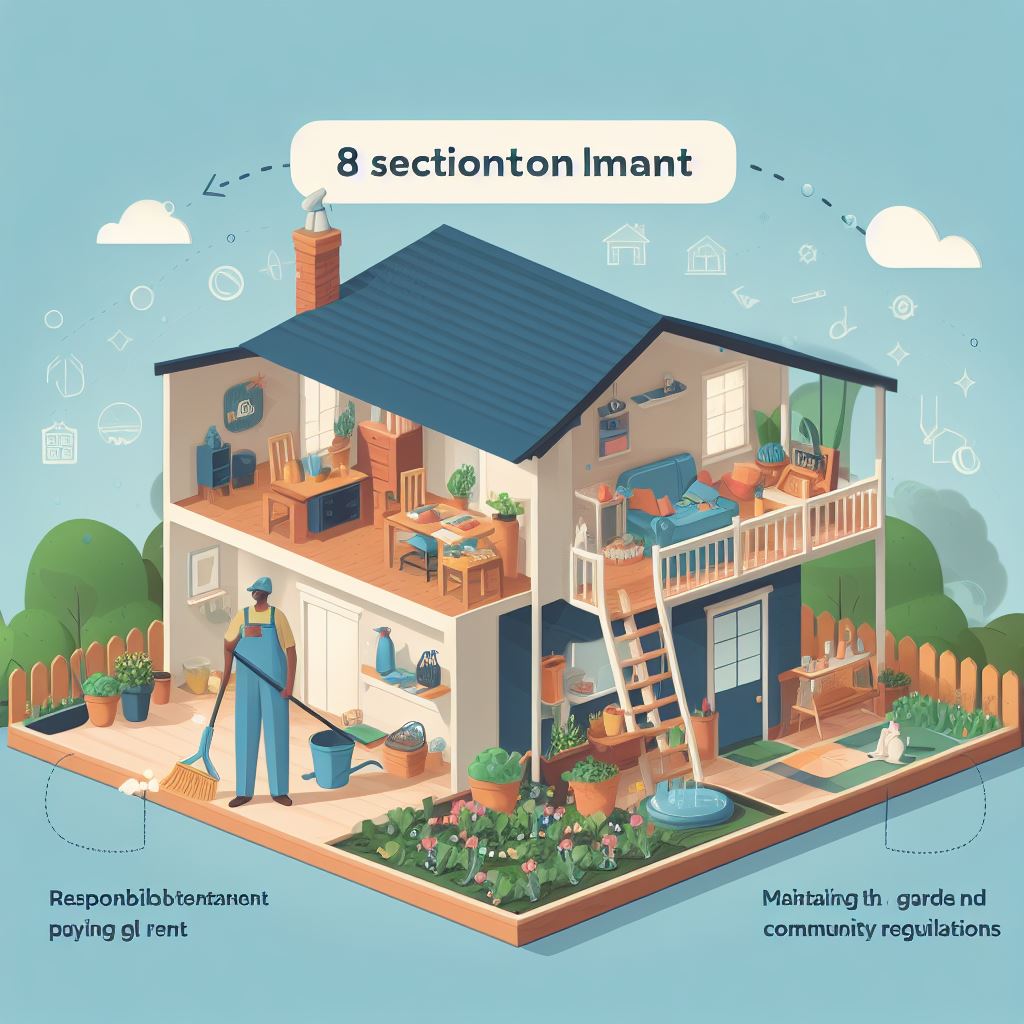Your Guide to Tenant Duties in Section 8 Homes

Are you ready to navigate the world of tenant duties in Section 8 homes? Get ready to learn about your responsibilities, eligibility requirements, and financial obligations.
In this concise and informative guide, we’ll help you maintain the condition of your Section 8 home and communicate effectively with your housing authority.
Stay tuned for expert advice and practical tips that will empower you to be a responsible and informed tenant in the Section 8 program.
Key Takeaways
- Eligibility requirements for Section 8 tenants include low income, U.S. citizenship or eligible immigration status, passing background checks, and providing accurate information about income, assets, and family size.
- Financial responsibilities for Section 8 tenants include paying rent on time, maintaining utilities, reporting income changes promptly, budgeting for rent payments, and avoiding late fees and eviction.
- Maintaining the condition of the Section 8 home involves regular cleaning, reporting repairs or maintenance issues, taking precautions to prevent damage, maintaining the exterior of the home, and proper waste disposal.
- Reporting changes in circumstances promptly is crucial for ensuring eligibility, accurate rent subsidy calculation, program integrity, and avoiding financial complications, while maintaining a good standing with the Section 8 program.
Eligibility Requirements for Section 8 Tenants
To be eligible for Section 8 housing, you must meet specific requirements set forth by the program. These requirements are designed to ensure that the assistance goes to those who truly need it.
First and foremost, you must have a low income, as determined by the Department of Housing and Urban Development (HUD). The income limits vary depending on the size of your household and the area you live in.
Additionally, you must be a U.S. citizen or have eligible immigration status. You must also pass a background check, which includes criminal history and credit checks. It’s important to note that certain criminal convictions can disqualify you from receiving Section 8 assistance.
Furthermore, you need to provide accurate and up-to-date information about your income, assets, and family size. Failure to do so can result in the termination of your Section 8 voucher.
Lastly, you must be willing to abide by the rules and regulations set forth by the housing authority and maintain the property in good condition.
Meeting these eligibility requirements is the first step towards securing affordable housing through the Section 8 program.
Understanding Your Financial Responsibilities
You are responsible for fulfilling your financial obligations as a tenant in a Section 8 home. It’s important to understand what these responsibilities entail in order to maintain a good standing and avoid any potential issues.
Here are three key financial responsibilities you should keep in mind:
- Paying Rent: As a Section 8 tenant, you’re required to pay your portion of the rent on time each month. This amount is determined based on your income and the size of your household. It’s crucial to budget accordingly and prioritize rent payments to avoid any late fees or potential eviction.
- Maintaining Utilities: In addition to rent, you’re also responsible for paying utilities such as electricity, gas, and water. It’s important to keep these services active and pay the bills promptly. Failure to do so may result in the termination of your lease agreement.
- Reporting Changes in Income: If there are any changes in your income or household composition, it’s your responsibility to report these changes to the Section 8 program promptly. Failure to do so may lead to incorrect subsidy calculations or even termination of your assistance.
Maintaining the Condition of Your Section 8 Home
As a tenant in a Section 8 home, it is essential to maintain the condition of your dwelling to ensure a safe and comfortable living environment. By taking responsibility for the upkeep of your home, you contribute to the longevity of the property and show respect for the investment made by the landlord. Here are some key aspects of maintaining your Section 8 home:
| Maintenance Task | Responsibility |
|---|---|
| Regular cleaning | Keep your home clean and tidy, including floors, walls, and fixtures. |
| Reporting repairs | Notify your landlord promptly of any necessary repairs or maintenance issues. |
| Preventing damage | Take precautions to avoid damage, such as using coasters to prevent water stains and keeping pets in designated areas. |
| Outdoor upkeep | Maintain the exterior of your home by mowing the lawn, trimming bushes, and removing debris. |
| Proper waste disposal | Dispose of garbage and recycling properly to prevent odors and pests. |
| Smoke detector checks | Test smoke detectors regularly and replace batteries as needed. |
Reporting Changes in Circumstances Promptly
Promptly reporting any changes in circumstances is crucial for tenants in Section 8 homes to ensure compliance with program requirements and maintain a smooth and transparent rental process. By promptly reporting changes, you can avoid potential issues and maintain a good standing with the Section 8 program.
Here are three important reasons why reporting changes in circumstances promptly is essential:
- Eligibility: Reporting changes in income, household composition, or any other relevant information is crucial to ensure that you remain eligible for the Section 8 program. Failure to report changes promptly may result in a violation of program rules and could jeopardize your housing assistance.
- Rent Calculation: Reporting changes in income or household composition promptly allows your housing authority to accurately calculate your rent subsidy. Failing to report changes may result in overpayment or underpayment of rent, causing financial complications for both you and your landlord.
- Program Integrity: Reporting changes promptly helps maintain the integrity of the Section 8 program. It ensures that assistance is provided to those who truly need it and prevents fraud or misuse of program resources.
Communicating With Your Section 8 Housing Authority
To ensure compliance with program requirements and maintain a smooth rental process, it is important to effectively communicate with your Section 8 housing authority. Open and honest communication helps you understand your responsibilities as a tenant and allows the housing authority to provide you with the necessary support and resources. Here are some key points to keep in mind when communicating with your Section 8 housing authority:
| Communication Tips | Benefits of Effective Communication |
|---|---|
| Be proactive | Ensures timely response and assistance |
| Provide accurate information | Helps in determining eligibility and appropriate support |
| Keep records | Allows for clear documentation of conversations and agreements |
| Follow guidelines | Demonstrates your commitment to the program |
| Ask for clarification | Helps in understanding program rules and regulations |
Frequently Asked Questions
Can I Make Changes or Modifications to My Section 8 Home?
Yes, you can make changes or modifications to your Section 8 home. However, you must obtain written permission from your landlord and follow any guidelines or restrictions outlined in your lease agreement.
How Long Can I Stay in a Section 8 Home?
You can stay in a Section 8 home as long as you comply with the program’s requirements and your income remains within the income limits. The length of your stay is not determined by the program.
Can I Have Pets in My Section 8 Home?
Can you have pets in your Section 8 home? Yes, you can have pets, but there are certain rules and guidelines you must follow. Make sure to review the specific policies outlined in your lease agreement.
What Happens if I Want to Move to a Different Section 8 Home in a Different State?
If you want to move to a different Section 8 home in another state, you will need to follow the guidelines set by your local housing authority. Contact them for more information and assistance.
Can I Sublease My Section 8 Home to Someone Else?
Yes, you can sublease your Section 8 home to someone else, but there are important rules and guidelines to follow. Consult your local housing authority for specific instructions and requirements.



